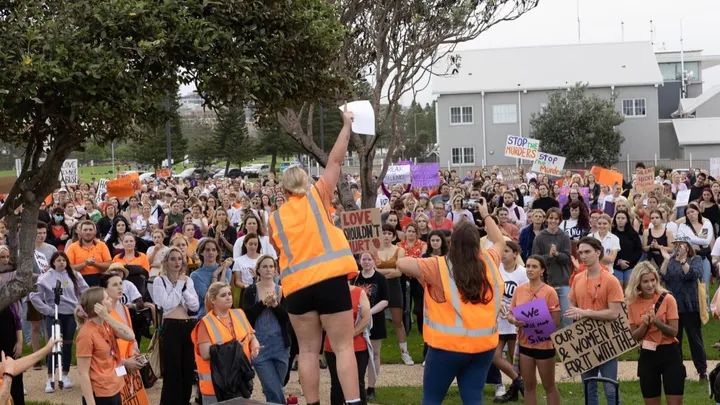
Builders’ battles belittle betterment
BY ALEC SMART
Whilst cracks appearing in new apartment buildings are dominating news headlines and analysts point the blame at dodgy builders, lax inspectors, corrupt developers and poor governance by the NSW Government, a vicious feud continues between two of the most powerful forces in the construction industry – the ABCC and the CFMMEU.
In 1997 Australia’s commonwealth and state governments agreed to adopt a National Code of Practice for the Construction Industry to establish agreed principles and standards of behaviour. These would apply to all dealings between the construction industry, their representatives and clients.
In 2001 retired NSW Supreme Court judge Terence Cole was appointed to head a Royal Commission into the Building and Construction Industry and in February 2003 the commission made multiple recommendations aimed at reforming industrial and safety practices and improving productivity.
Additionally, an independent commonwealth agency, the office of the Australian Building and Construction Commissioner (ABCC) was created to oversee application of the National Code.
According to the ABCC website, they are “an Australian Government agency responsible for ensuring that building work in Australia is carried out fairly, efficiently and productively – for the benefit of all employers and workers in the industry, and for the benefit of the Australian economy as a whole..”
City Hub reported in February 2018 that the ABCC were warning construction companies that they faced a ban from obtaining federal government contracts if their worksite employees flew a Eureka southern cross flag or displayed union-affiliated symbols on clothing and equipment.
This mandate was issued in response to new regulations – a revision in Building Code 2016 – pronounced by then Prime Minister Malcolm Turnbull’s administration.
As representatives of the Australian Government, one wonders why the ABCC devoted energies to the banning of a flag that many Australians respect as a symbol of democracy and rebellion against tyranny.
The Eureka Rebellion in December 1854 began in opposition to the British Colonial powers’ introduction of a miner’s license and what gold miners claimed were unfair laws allowing police to bully and evict them indiscriminately.
Rebecca MacFarling, CEO of the Museum of Australian Democracy at Eureka on the site of the rebellion in Victoria, where the original Eureka blue flag is still displayed, told City Hub: “We believe that the Eureka flag is owned by all Australians and represents the origins of democracy, inclusivity and diversity in our modern nation.”
“A taxpayer-funded war against unionism”
The new anti-flag regulations were widely interpreted in the construction trade as an attempt to stifle support for the powerful Construction, Forestry, Maritime, Mining and Energy Union (CFMMEU). CFMMEU is Australia’s main trade union in the aforementioned industries and affiliated with the Australian Council of Trade Unions (ACTU) and the Australian Labor Party.
CFMMEU’s Dave Noonan, national secretary of their construction division, issued a statement: “It just demonstrates what we have been saying all along, which is the ABCC is not about industry reform, it’s not about productivity, it’s not about freedom of association, it’s a taxpayer-funded culture war against unionism in the industry.”
And yet, according to the results of multiple Federal Court cases, the CFMMEU are no angels.
For example: in January 2014 the Sydney Morning Herald reported “Officials from Australia’s powerful building unions are being bribed by corrupt companies that need their support to win multimillion-dollar contracts. An investigation by Fairfax Media and the ABC’s 7.30 program has identified several influential Construction, Forestry, Mining and Energy Union officials, organisers and shop stewards in NSW and Victoria who have been given bribes and other inducements by the companies.”
In January 2015, the Federal Court found the CFMMEU engaged in “co-ordinated and strategic action … resulting in deliberate contraventions” on construction sites. The court penalised the CFMMEU and 10 of its officials a total of $205,100.
A fortnight later Nigel Hadgkiss, director of the Fair Work Building and Construction, wrote in the Sydney Morning Herald that “The CFMMEU has a proven track record of using bogus safety issues to get on to a site to pursue its industrial agenda.”
In March 2015 the Federal Court imposed total penalties of $142,000 on the CFMMEU and three of its officials for taking coercive action at a Carlton building site in Melbourne.
In December 2016 Prime Minister Malcolm Turnbull reinstalled the ABCC with new legislative powers that required all companies doing construction or related work to follow the National Code’s policies on trade union membership and limiting their power to call pickets and site inspections. If firms didn’t comply, they were prevented from obtaining Commonwealth work.
The Conversation reported: “In this legislation, the union-busting and potential for civil rights infractions that characterised the introduction of these laws into parliament by the Abbott government in 2013 remain mostly intact.
“The laws that have re-established the ABCC will not help the workers who have already lost their lives
because of failed safety precautions … In fact, by reducing the power of unions to inspect and operate on building sites and by persecuting unionists in a quasi-criminal tribunal, a revived ABCC jeopardises safety protections for construction workers and waters down workplace rights in the industry.”
The CFMMEU themselves stated: “Safety is a major concern of unions and the construction industry is one of the most dangerous places to work … The right to a safe workplace is internationally recognized and enshrined in law in many countries. The ABCC laws trample all over this right as workers become fearful of speaking out due to the harsh penalties they face.”
Rift widens
Nevertheless, the division between the ABCC and CFMMEU and their respective supporters widened.
In August 2018, the CFMMEU released a statement calling for the abolition of the ABCC
“Last financial year the Turnbull government spent more than 10 million dollars in its attack on construction workers,” said John Setka, Victorian Secretary of the CFMMEU Construction Division. “Again and again the Liberal Party’s ABCC is caught out blowing their budget and overreaching in their ideological war against unions.
“The ABCC does nothing about wage theft, sham contracting and safety short cuts that kill workers, that’s left to us, the CFMEU. Then they waste more money attacking us for doing our job.”
Then, in a September 2018 letter to the Senate crossbench, Australian Mines and Metals Association (AMMA) chief executive Steve Knott warned parliament needed more than the ABCC to take on the CFMMEU.
“The specialist workplace regulator for the building and construction industry, the ABCC, does an admirable job in investigating and bringing about prosecutions against the CFMMEU for thuggery, intimidation and unlawfulness on Australian building sites,’’ he wrote.
“However, the evidence is overwhelming that Australia’s current workplace laws, fines and
penalties are proving woefully inadequate in deterring the union from future law-breaking and community disruption.”
After the Opal Tower was found to be unsafe and rapidly evacuated on Xmas Eve 2018, NSW Liberal Government Minister for Better Regulation, Matt Kean, was quick to blame his political opponents. “The mess that’s been created was done by Labor; Michael Daley [then NSW Labor leader] was part of the government that privatised certifiers in NSW and allowed cowboys and shonks to operate in this industry,” he said.
In April and July 2019, respectively, the Federal Circuit Court in Sydney imposed penalties of $40,400 and $13,500 against the CFMMEU and its organiser Luke Collier after he refused to follow OH&S procedures while on the Barangaroo construction site.
Collier was found to have attempted to intimidate ABCC inspectors by reading out one of their mobile phone numbers during an address to fellow workers.
Combined penalties of $1.7 million were imposed by the Federal Court against the CFMMEU and a number of its senior officials for unlawful conduct at the Barangaroo site. The CFMMEU’s National Office was fined $1,007,250 and the CFMMEU’s NSW office was fined $510,000.
On 23 April 2019 AMMA reported that a “Federal Court judgment last week took penalties awarded against the CFMMEU in cases brought by the Australian Building and Construction Commission (ABCC) beyond $8 million.”
Minister for Jobs and Industrial Relations, Kelly O’Dwyer, said “the CFMMEU has now been penalised over $16 million for unlawful conduct in cases brought by the ABCC and its predecessors, with 80 of its representatives currently before the courts.”
In May 2019, the ABCC began pursuing the senior leadership of the CFMMEU in the Federal Court over alleged intimidation, damage to equipment and unlawful picketing of Sydney-based Botany Cranes. CFMMEU national secretary Dave Noonan denied the allegations and accused the ABCC of being “a political arm of the Liberal Party”.
“It’s clear the ABCC is accelerating the lodging of cases due to the imminent federal election,” he said. “They’ve lodged 11 this year and some concern allegations as recently as February. It’s extraordinary for matters to be investigated and come to prosecution this quickly.”
The Morrison Government is currently in the process of reintroducing the Ensuring Integrity Bill, criticised as a ‘union-busting’ measure by the CFMMEU and the ACTU, which stands a better chance now than when it was rejected in 2017, as it has the support of 4/6 Senate crossbenchers.
It will bolster the existing Corporations Act, which empowers the Australian Securities and Investment Commission (ASIC) to disqualify company directors. Under the Ensuring Integrity Bill, the Registered Organisations Commissioner, a government minister, or any person with a ‘sufficient interest’ will have the power to apply to the Federal Court for the disqualification of a union official.
ACTU president Michele O’Neil warned that the proposed laws were a dangerous attack on democracy and would make it harder for workers to win pay rises, protect jobs and workplace safety.
“If unions are shut down or silenced, who will stand up to the powerful, make sure workers get their rights and fight to improve workers’ rights?” she said.
“The Morrison government has overseen raids on journalists and is now attacking working people’s freedom to run their own unions.”
Meanwhile, on a positive note, a NSW Government inquiry into the regulation of building standards, quality and disputes has been established, chaired by Greens MP, David Shoebridge, with Shooters, Fishers and Farmers Party leader, Robert Borsak, as Deputy Chair.
The committee is also soliciting the views of interested stakeholders via an online questionnaire.
David Shoebridge said: “With an increase of high-rise apartments, particularly in the Sydney region, it is extremely important that the NSW Government has adequate regulation and oversight of the building industry, including appropriate consumer protection, and are responding to building defects in a timely and effective manner.”









